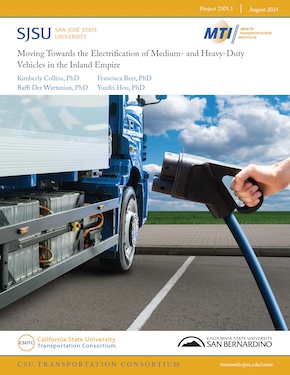- 408-924-7560
- mineta-institute@sjsu.edu
- Donate
Moving Towards the Electrification of Medium- and Heavy-Duty Vehicles in the Inland Empire
This report investigates the transition to zero-emission medium- and heavy-duty vehicles (MDHD) within California’s Inland Empire (IE), emphasizing the significance of electric vehicle charging infrastructure and opportunity charging strategies in facilitating sustainable transportation. Utilizing a mixed-methods approach that combines a systematic literature review, geospatial and big data analytics, and thematic analysis of expert interviews, the study explores the multifaceted challenges and opportunities of electrification. The literature review assesses policies at various governance levels, while geospatial analysis identifies regional traffic patterns and infrastructure needs. Big data analytics examine vehicle movements, complemented by insights from interviews with 16 regional experts, offering a real-world perspective on the transition. The findings underscore the critical role of federal, state, and regional policies in supporting the shift towards zero-emission vehicles, highlighting the necessity for collaborative efforts to overcome infrastructural and financial challenges. The analysis reveals distinct operational patterns and infrastructure capacities across the IE’s subregions, suggesting tailored electrification strategies to accommodate diverse needs. The study emphasizes the importance of equitable and economically viable approaches, particularly for small business stakeholders in the electrification process. Conclusively, the transition to MDHD EVs, while promising environmental and public health benefits, requires a nuanced, region-specific strategy that considers economic and infrastructural realities. Recommendations include adopting dynamic, adaptable policies, providing targeted financial incentives, standardizing charging technologies, and ensuring equitable benefits distribution. This comprehensive approach aims to balance technological advancements with supportive policies and equitable practices, facilitating a socially responsible and inclusive transition to sustainable transportation.
KIMBERLY COLLINS, PHD
Dr. Collins is the Executive Director of the William and Barbara Leonard Transportation Center (LTC) at California State University, San Bernardino. The LTC is a regional transportation center focused on improving innovation in transportation administration and policy through data driven decision making. In addition to her role at the LTC, Dr. Collins is a Professor of Public Administration at CSUSB. Kimberly’s current research focuses on social equity, sustainability, networks, and democracy in communities, particularly in peri-urban areas and borderlands. She is the Chair of the Good Neighbor Environmental Board (a U.S. EPA Residential Advisory Commission) and is the North American Regional Editor for the Journal of Borderlands Studies. Kimberly received her PhD in 2006 from El Colegio de la Frontera Norte in Tijuana, Baja California, Mexico.
RAFFI DER WARTANIAN, PHD
Dr. Wartanian is a research fellow specializing in transportation policy, data science, sustainability, and equity. His research endeavors at the Leonard Transportation Center are multifaceted, encompassing vehicle electrification, decarbonization, big data analytics, traffic and transportation modeling, geospatial analysis, and public policy. Moreover, he is invested in examining the environmental aspects of transportation systems, with a focus on global warming, GHG emissions and sustainable practices. Another salient aspect of his research deals with social equity and the interplay between transportation policies and economic development. His work incorporates extensive data analysis and involves collaboration with various public and private stakeholders.
YUNFEI HOU, PHD
Dr. Hou is an associate professor in the School of Computer Science and Engineering at California State University San Bernardino and associate director at Leonard Transportation Center. He received his PhD from the Department of Computer Science and Engineering at the State University of New York (SUNY) at Buffalo in 2016. His current research interest includes applications in transportation cyber-physical systems, data and information analysis for transportation engineering, and STEM education. Recent projects span areas such as vehicular sensing in smart cities, traffic management with connected vehicle technologies, transportation cybersecurity, and data science education.
FRANCISCA M BEER, PHD
Dr. Beer is the Associate Dean/Director of Academic Equity at California State University, San Bernardino (CSUSB). With a PhD in Finance, a graduate degree in Computer Science, and a Master’s in Commercial Engineering, she is a Professor of Finance specializing in behavioral finance. Dr. Beer’s extensive research portfolio includes over 50 articles in respected journals, earning her a “Distinguished Research Fellowship” in 2017. Beyond research, she is deeply committed to student success, initiating programs such as Trendsetters, the Voice series, and JHBC ShEconomy. Dr. Beer is a fervent advocate for financial literacy. Through workshops, coaching, and seminars, she tirelessly empowers individuals and communities with essential financial knowledge. Her career reflects her unwavering dedication to academia, research excellence, and a mission to transform lives through financial education.
-
Contact Us
San José State University One Washington Square, San Jose, CA 95192 Phone: 408-924-7560 Email: mineta-institute@sjsu.edu






